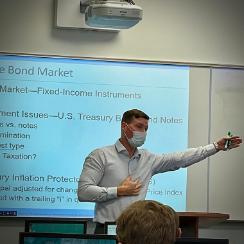Making an Impact: Robert Killins, Ph.D.
Robert Killins, Ph.D., associate professor of finance, has been a member of the Wall College faculty since August 2019. He is a great role model for students interested in pursuing careers in finance or economics, and he offers some helpful advice and resources for those looking to strengthen their research skills, and we are excited to showcase his research and for the CCU community to get to know him.
Originating from a farm outside of Toronto, Canada, Killins moved to the United States to play baseball on a scholarship at the University of Texas-Rio Grande Valley. There, he earned his bachelor’s degree, MBA, and a Ph.D. with an emphasis in finance. He has several years of experience working in the banking and logistics industries, as well as teaching at universities throughout Canada and the United States.
Soon after joining the Wall College of Business, the COVID-19 pandemic placed a hold on in-person teaching, which forced college faculty around the world to teach and collaborate using virtual platforms. Although Killins was unable to meet with his colleagues in person, he was able to connect with them virtually to collaborate on research projects. He and Sourav Batabyal, Ph.D., assistant professor of economics, worked together on, “The Influence of Oil Prices on Equity Returns of Canadian Energy Firms,” which was published in the Journal of Risk and Financial Management as well as several other published articles. He also worked with Hongxia Wang, Ph.D., associate professor of finance, on “Goodwill Impairment and CEO Overconfidence” for the Journal of Behavioral and Experimental Finance.
Killins enjoys collaborating with other professors, “Because everyone has their own unique skills and expertise and can take on individual roles they are most passionate about.” In the world of finance and economics, he is most enthusiastic about investing and how certain factors can impact a firm’s assets or stock prices. Specifically, he is focused on the Canadian equity market and its financial institutions, transportation companies, and energy markets.
According to Killins, an emerging area of research is socially responsible investing, due to sustainability metrics being emphasized by companies to appeal to consumers and environmental lawmakers. He poses an interesting research question in the field of economic research: Does corporate social responsibility have a positive impact on financial performance and profitability? He states that many large oil companies have been criticized for backing out of opportunities to extract large quantities of oil in Canada, and there can be a divide between what is financially responsible and what is socially responsible for large corporations. Killins believes there needs to be more research on how to accomplish both.
Killins served as a judge for last year’s annual research competition at CCU, and he said competitions like this are a great opportunity for students to build their resumes, get the experience required for capstone classes, and inspire more intensive research projects down the line. Killins wants students to know they should not be intimidated by research in business fields and that research is not all about collecting big data sets and crunching numbers. There are several resources in the Wall College to help students with their research projects in class and personal projects for conventions.
The Pilosof Finance Lab, which was funded by Richard Pilosof, a 1983 CCU finance graduate, is equipped with high-quality data sets and other tools for students to take advantage of. Killins uses these benefits for his own research papers and encourages students to use them as well.
Another resource for students interested in getting experience with investing is the Gerald Boyles Student Investment Fund, a student-managed investment fund that offers dedicated, motivated, and well-prepared students the opportunity to engage in various investment strategies and decisions in managing real money in real-time. Killins integrated the investment fund into one of his 400-level courses and encourages students to use resources like The Boyles Fund to practice with before they make their own personal investments.




